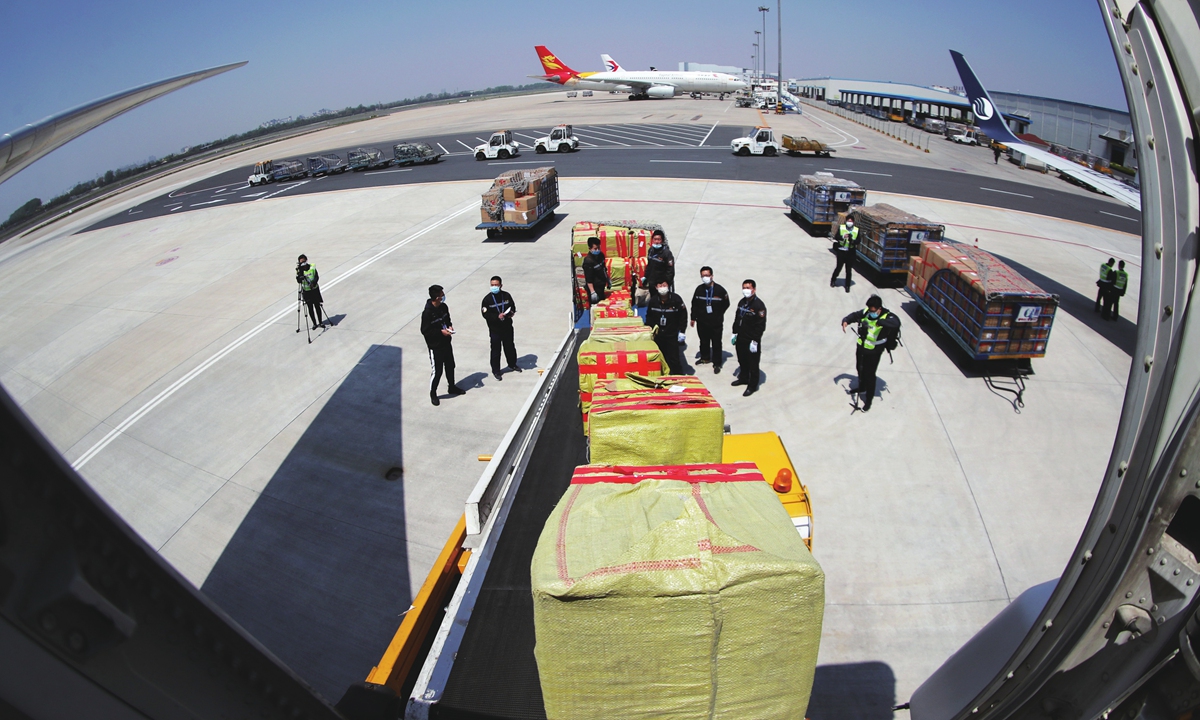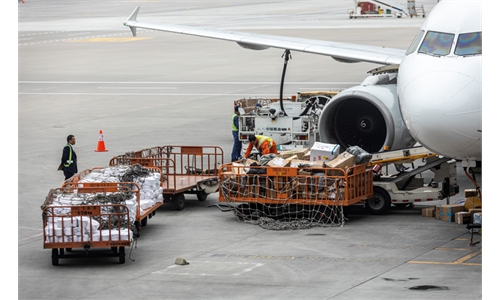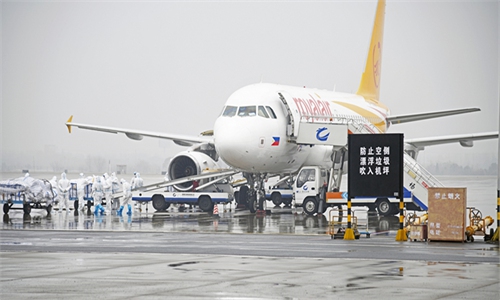Stop of passenger-to-cargo flights services may further tighten air capacity, push up freight fees
New regulations may further tighten air capacity, push up intl freight fees

Freight handling staff move epidemic prevention materials onto the passenger-to-cargo aircraft in April 2020. Photos: cnsphoto
China's civil aviation regulator said it will end previous passenger-to-cargo flights, with cabins now restricted to transporting anti-epidemic items. Market insiders predict that the new regulations will further tighten air capacity during the epidemic, pushing up international air cargo fees.
The Civil Aviation Administration of China (CAAC) said that from January 1, 2022, passenger cabins will only be allowed to carry anti-epidemic-related items.
The new regulations also prohibit cabin seats to be removed to increase cargo space. Airlines that have removed or are readjusting cabin layouts to fit more cargos are required to restore aircraft to their original configuration.
Market watchers said the move is mainly due to transport safety, in a bid to "ensure the safety of cargo flights," but it will hurt the air cargo transport capacity, and further push up the cargo prices, given the limited market for anti-epidemic-related items combined with rising fuel costs.
The Global Times learned that the "passenger-to-cargo" aircraft mainly refers to planes which have been modified to fit more cargos by removing passenger seats. This is a temporary modification with seats able to be refit based on demand. Because the cabin floor has a low load-bearing capacity, it is generally used for large and light goods, including masks, protective clothing, medical equipment and e-commerce packages.
Market watchers said there are some passenger-to-cargo aircraft which are not carrying goods in their cabin, only in the aircraft belly, but are at the same time also transporting passengers, therefore classified as "passenger-to-cargo" aircraft.
News portal caixin.com reported that the new measures are currently only applied to domestic airlines, with overseas airlines yet to receive guidance on the matter. But several airlines are currently working to restore the original configuration of the aircraft with the seats removed.
"It will defiantly push up the cargo fees," Lin Zhijie, an independent market watcher, told the Global Times on Wednesday, as the move will inevitably reduce the cargo capacity. Because after the seats are installed, capacity is more limited, which will affect the entire air cargo capacity supply, leading to higher prices for air cargo freight.
Global cargo transport has been stretched over recent months, and air freight rates have been running at near historic highs.
Taking the routes of Hong Kong-North America, Hong Kong-Europe, and Frankfurt-North America as an example, average freight rates from January to July of 2021 increased by 106.9 percent, 65.4 percent and 90.6 percent respectively compared with the same period in 2019, according to Essence Securities.
Reception staff from the cargo arm of China Southern Airlines told the Global Times on Wednesday that the cargo price for masks was 97.2 yuan ($15.2) per kilogram from Guangzhou, South China's Guangdong Province to Los Angeles, much higher than the rate prior to COVID-19 outbreak.
While capacity may be impacted, freight rate increases also depend on the demand, a source within a logistics arm of a state-owned carrier told the Global Times on Wednesday.
Considering that it will take time for the belly hold capacity of international passenger aircraft to recover, and the implementation of the new "passenger-to-cargo" regulations in 2022, it is expected that the international air cargo market will remain lucrative for commercial carriers, Guotai Junan Securities said on Wednesday.
Airlines have been mobilizing a large number of idle passenger planes using the "passenger-to-cargo" method to offset the huge losses in passenger travel.
In the third quarter, the total losses of eight domestically listed passenger airlines reached 11.114 billion yuan. Except for Spring Airlines, which recorded a modest profit, China's remaining seven airlines all recorded losses. Among them, total losses of the country's three state-owned airlines exceeded 7.9 billion yuan.
Market watchers said that the introduction of the new regulations is mainly due to safety considerations.
There is also concern over an increased fire risk in the cabin, an anonymous insider told the Global Times on Wednesday.
He said that due to the lack of an automatic fire extinguishing system in the cargo compartment, the cabin usually can only store "items that need to be supervised" and requires the presence of qualified crew members.
On April 21, the CAAC issued an announcement addressing the transportation of cargo in the cabin. It warned that the removal of passenger seats to make way for cargo should be made with caution.
The CAAC said that the design of modern passenger aircraft did not account for a large amount of cargo transportation in the passenger cabin, noting that the passenger cabin for passenger aircraft is significantly different from the belly cargo compartment or the main cargo compartment of the cargo aircraft, and no smoke or fire detection or fire detection is designed and installed.


